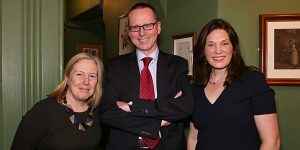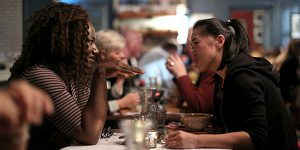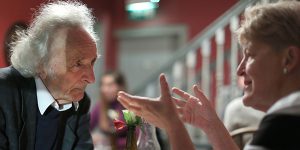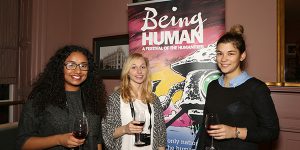January 13, 2017, by Matt Davies
Being Human festival launch -Nottingham Portrait of a City by DHC Leonardo Fellow Amber Forrest
A Nottingham Muse project by Amber Forrest and Theodore Zeldin opening the Being Human festival on November 17th, 2016 with the Digital Humanities Centre team and student volunteers of Nottingham University.
‘I didn’t think you’d pull it off’. Were some of the first words that Pro Vice Chancellor Jeremy Gregory said to me when he walked into a packed Jamie Oliver’s on a freezing November evening. There was not a free seat and two extra rooms were opened up to accommodate the overflow. I must thank him for believing in the possible enough to enable us the opportunity to show how the project can benefit the community, business and the University in equal measure. Jeremy’s grace and surprise was a delight to see and I hope that everyone in this project, as they all certainly did on the evening, will keep surprising each other.
We had issued to the people of Nottingham an open invitation for those of every walk of society to meet fellow inhabitants of the city whom they had never met and engage in a conversation, designed by Theodore Zeldin, about what is most important in their lives and their work.
Everyone we spoke to was interested in different aspects of the project; be it the conversation and social cohesion, the literacy aspects of writing or encouraging self-portraits through to the possible benefits and outcomes for collaboration in professional environments and across departments or the possibilities of the work that could be generated creatively or via research from such a body of writing. The University volunteers did an amazing job feeding into twitter and face book and talking to people throughout the community. On the evening they made everyone feel welcome as they arrived, updated live twitter feeds and organised the evaluation and recording agreements for participants.
There was an enthusiastic response from the police, the military, the university, Rotary, the homeless, a group of people with disabilities, the football club (both member groups, the club business and sportsmen), Central libraries, private businesses and the NHS. Among the diners there were people from business, architecture, engineering, politics, banking, zoology, biology, heritage, nursing, education, retail, law, refugees, teachers, artists, media workers and from many countries including Nigeria, Spain, Belgium, Iraq, France, Germany, India, Pakistan, Poland, China , Ukraine, Vietnam and the members of the local community. Having some language and international students involved helped to make community members from other places feel welcome.
Each person was seated at a separate table randomly in front of someone they did not know, and the students gave them all a Menu of Conversation listing topics to discuss, designed to focus their conversation away from trivialities and unconscious scripts onto the major problems that affect everybody’s life.
Jeremy gave an enthusiastic and supportive speech about the festival, the project and the Universities desire to be further involved, recognising it as an opportunity to really engage the humanities with the community and business in a functional way. Then Theodore spoke about the importance of the role of humanities across different departments and otherwise seemingly unconnected fields. He spoke widely of finding our relevance to each other and pushing the boundaries of our work through collaboration. He also spoke of ways that business and organisations can support that level of productivity and how it relates to the changing tides throughout the world and future impact.
Student volunteers from the University’s film society and DHC, photographers and those interested in translation, evaluation or sound recording set up equipment throughout the room. Mr Beef (Andy Holland) a local street artist did an amazing painting of the conversation as it unfolded and provided a visual energy and symbol of what was happening in the room and producing another level of work. His work was immediate, beautiful and an inspiration to watch unfolding at the event.
The energy from the guests was electric. The talented James Walker of the city of literature said to me; ‘The city has to get behind this, it’s wonderful!’ The night cemented in me the belief that Nottingham is a fascinating city that when coming together at such events can and will navigate the challenges that the future presents in many ways. Further branding the city as a unique place to do business, solve challenges, create or study through its willingness to embrace unique practices and deeply functional processes that accommodate the entire community.
This was not an academic event for academics, an arts event for artists, nor an act of charity or business networking in which you are presented by the same class reading the same books. This really was a Being Human event and allowed everyone to contribute and to be curious about what that means.
The self-portraits are beginning to come in and we are working with writers and our volunteers to help the contributors clarify their pieces. These pieces are a searchable database of the stories and thoughts of those that lived in Nottingham at this time. It is so exciting to see the body of work growing. Filming has begun on several portraits and the volunteers are styling each piece as their own and I am hoping to guide this into valuable portfolio pieces for them.
I have spoken to several organisations and we now have a few bookings as far forward as September for giving lectures on the process and hosting further conversation events. So please make contact if you are interested in being involved.
We are also currently working out the details with a major Nottingham business who wishes to involve at least 500 of its staff in our self – portrait program. It seems we have also inspired them to create a major collaboration project within the city – but more on that later.
In March we will be hosting a very special dinner in London with the top ten clients of a major PR company –engaging functional ways in which these methods can attempt to solve the many problems that modern companies and the modern work force are facing.
People fed back to me how they expected to learn about someone else but came away having learnt more about themselves. They said they learnt a great deal about the financial and staff difficulties of different organisations, and how it made them both think about how new forms of collaboration could alleviate these. One person marvelled that this unusual dialogue led him to ’say things that I have never told anybody before’. Members of different departments commented on how they found new relevance in each other’s work and new values in their own.
There was no requirement to like each other during these conversations but many people were delighted and surprised when they found friendship, support or a sense of belonging in a new community, culture or department. I have since spoken to many people who are still in contact and are enjoying a unique friendship formed in unusual circumstances.
Special thanks to Jamie Oliver’s for being such a flexible and accommodating venue, to DHC director

Sally Bowden (Head of Research, Faculty of Arts, UoN) Jeremy Gregory (Pro Vice Chancellor, Faculty of Arts, UoN), Amber Forrest (Leonardo Fellow, Digital Humanities Centre, UoN).
Katharina Lorenz for the DHC’s sponsorship, organisation, equipment and fantastic support of the event. Pro-vice chancellor of Humanities Jeremy Gregory, Head of Research and Knowledge Exchange Sally Bowden for her endless vision. DHC manager Matt Davies and the student volunteer teams deserve a very special thanks for their wonderful work before, after and during the event. The centre is full of engaging, talented and dynamic people who strive for both quality and productivity. Thank you to all of the guests who participated and to all of the various academics from many different departments, private businesses and organisations who gave me so much encouragement and energy along the way.
Look out for new dates from your local BBC Nottingham, twitter and the DHC. We will keep you updated on who is supporting the project, how to get involved and where it goes from here.
Photographs by Andrew Hallsworth for the University of Nottingham.
No comments yet, fill out a comment to be the first




Leave a Reply